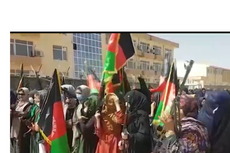Joe Biden has long been a critic of the War in Afghanistan. His decision to withdraw shouldn’t be a surprise
The president’s skepticism of nation-building in Afghanistan is a consistent animating principle of his politics for more than a decade
In 2009, only a few days before he was sworn in as vice president, Joe Biden gave a grim view of the state of the War in Afghanistan, telling The New York Times that the situation had “deteriorated significantly” and “it’s going to be a heavy lift”.
Now as president, Mr Biden is leading the United States’ withdrawal from Afghanistan after two decades of conflict and more than 2,000 American lives lost, as well as countless Afghan civilians. Meanwhile, UK Prime Minister Boris Johnson has followed suit, announcing British troops would exit Afghanistan.
Many questions remain, though, especially as the Taliban have made significant gains across the country. And Mr Biden has been cagey when reporters have asked him questions about the drawdown.
But if Mr Biden has proven himself politically pliable on everything from abortion to LGBT+ rights to the economy, his skepticism of nation-building in Afghanistan is a consistent animating principle of his politics for more than a decade, often to the criticism of more established voices on foreign affairs.
In 2009, as then-President Barack Obama was weighing whether to increase the number of troops in Afghanistan, Mr Biden emerged a voice of dissent against then-Gen Stanley McChrystal’s request for a surge in forces.
Rather, Mr Biden wanted to focus on “CT Plus”, which emphasized building Afghanistan’s security forces, counterterrorism against al-Qaeda and trying to peel off some fighters for the Taliban.
Mr Biden might have also had reservations about nation-building because of the fact his son Beau served in the Delaware National Guard before entering politics himself. During one confrontation with Richard Holbrooke, Mr Obama’s special envoy to Afghanistan and Pakistan, Mr Biden snapped, “I am not sending my boy back there to risk his life on behalf of women’s rights!” He added that “It just won’t work, that’s not what they’re there for”. The younger Biden’s death from brain cancer in 2015 was one of the many reasons his father passed on running for president in 2016.
Mr Biden’s position put him at odds with many officials in the Obama administration, including then-Secretary of State Hillary Clinton and then-Defense Secretary Robert Gates, who supported a troop increase.
Mr Biden’s dissents also earned him the derision of some in national security circles. In an infamous 2010 profile of Mr McChrystal in Rolling Stone, the then-general was quoted joking that he misheard Mr Biden’s name is “Bite Me”. Mr Gates wrote in his 2014 memoir that though be believed Mr Biden was a “man of integrity”, he thought Mr Biden “has been wrong on nearly every major foreign policy and national security issue over the past four decades”.
Similarly, had Mr Biden run against Ms Clinton in 2016 for the Democratic presidential nomination, their contrasting views on Afghanistan would have been a major dividing line between the two candidates. In fact, Ms Clinton, together with former Secretary of State Condoleezza Rice, expressed concern about the withdrawal of troops to the House Foreign Affairs Committee earlier this year.
But Mr Biden’s critiques persisted. Ten years after his pre-swearing-in trip, amid the Washington Post’s revelations in its deep dive of documents on the war, Mr Biden, then a candidate for the Democratic nomination for president, said during a debate that “rebuilding that country as a whole is beyond our capacity”.
This doesn’t mean the president is a dove. While a senator, he was both chairman and the ranking Democrat on the Senate Foreign Relations Committee and supported military action in Bosnia and Kosovo. Like many Democrats, Mr Biden supported the War in Iraq before eventually souring on the venture. In the days after the September 11 terrorist attacks, Biden joined 97 other Senators in the authorization of the use of force that launched the modern-day War on Terror.
Similarly, in his speech announcing the withdrawal from Afghanistan in April, Mr Biden said the United States would reorganize its assets to prevent the emergence of terrorists and said the metastasizing nature of terror was why military presence in Afghanistan made no sense.
At the same time, Mr Biden’s choice to withdraw from Afghanistan shows he doesn’t see it as worth spending national resources. He is, of course, not the first president to look at the war skeptically. His predecessor Donald Trump previously called the war a “total disaster” before increasing the number of troops.
Mr Biden’s plan will likely continue to be criticized, especially if Afghanistan unravels or descends into chaos once the last troops leave the region. But now as commander-in-chief, after his critics have dominated much of the discussion in Afghanistan with America still bogged down in the conflict, Biden has an opportunity to see if his strategy is any better.
Join our commenting forum
Join thought-provoking conversations, follow other Independent readers and see their replies
Comments

Bookmark popover
Removed from bookmarks